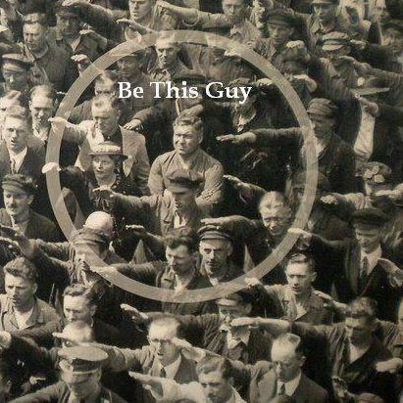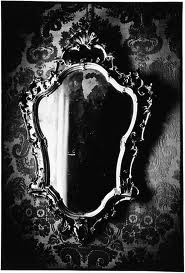In an age when there is so much concern about political correctness, tolerance, minority rights and the public good, it is essential to remember that the smallest minority in the world is the individual.
The individual has no group lobbying for him, no party representing him. Movements, parties, churches, sports teams, associations, and all other "group-think" entities are, by definition, "collectivist". They unite people around common values and goals, not individual ones. There is nothing inherently wrong with any of them. In fact, they are an expression of "individual" choices.
Still, there is the danger that these "individual" choices made in a "group-think" environment will trump what is the essence of political freedom - the ability of the individual to live his life relatively free of unnecessary constraint. This was clearly in the forefront of the American founders' minds when they used the language "...endowed by their Creator with certain unalienable Rights, that among these are Life, Liberty and the pursuit of Happiness.
Life, Liberty and the Pursuit of Happiness are all explicitly "individual" matters not societal ones. The purpose of law, the meaning of freedom is the protection of individual rights. This is not to say that "social justice" is an invalid concept, but the subjection of the minority to the majority is, and always will be, tyranny.
"Mirror mirror on the wall, who is the fairest of them all." Taken from the childhood tale of vanity known as Snow White, this well-known phrase rolls off the tongue so marvelously.
Hubris and envy are certainly not some secret Achilles heel of the human race. In fact, they are maladies from which we all suffer. We all desire to be worshiped. Some say "liked" or "loved" but the fact is we want to be adored as smart, beautiful, funny, compassionate, bohemian or whatever.
The story of Snow White is above all a tale of vanity and jealous desire, our corrupted lust for the destruction of those better than us, especially when we realize we cannot rise to their level. So, when the Queen finds she's no longer the most beautiful, she tries to kill Snow White and thus regain the crown.
I know how the Queen feels, especially as an author, because, like the Queen, an author is "in the public eye." It is very gratifying to hear someone say that they've enjoyed something I've penned, that my writing has made them see things in a different light, or that a particular scene gave them an adrenaline rush.
The truth is I love to read reviews both public and private which stroke my ego. Who doesn't? We all want to look at ourselves and see something beautiful, something worthwhile, something good.
The mirror we most often judge ourselves by is not the one on the bathroom wall, but the people who reflect back to us what they see.
The feedback we get from others can have a profound impact on our own self-perception. It is also extremely important because we may have huge blind spots and others can help point those out. But, the "mirrors" around us, i.e. the friends, colleagues and family members we interact with may not always be as "faithful" as our bathroom mirror.
Allow me to illustrate with a trite example. I remember someone saying a couple of years ago, "I'd never want to work for you." It was said offhandedly in the context of running a company and without any explanation. I'm not sure how it was intended, but it felt liked I'd just been slapped in the face. What's strange is that the person making the comment has never seen any of my interaction with my colleagues nor does he know anything about how I run the business. Yet, still it stung.
In fact, the statement made such an impact on me that I often reflected on how he had formed this opinion. Yes, I am a "driver", someone who has high expectations from others and myself. I don't accept excuses and demand results. I'm sure this is the part of my personality that prompted his comment. Add to this the fact that all of my conversation about the business was related to my frustration with the problems I faced and it is easy to see how he formed such an opinion.
Of course, people who have worked with me for over a decade would clearly disagree with his assessment and do it based on a better understanding of who I am. I take some solace in that, but the statement still stung, not because it was necessarily a reflection of who I am, but of who I am perceived to be. And sadly that is sometimes more important to us.
One of the ironies of the human experience is that very few people actually know each other well enough to understand their fellow man on anything but a superficial level. My point is that much of the criticism we receive will come from people with this same superficial understanding of who we are, and so should not be taken too seriously.
The mirror in the story of Snow White could not lie. Not only did it reflect the Queen's physical appearance faithfully, but it answered her questions honestly. It is my hope that you are affirmed by the people you meet, but more importantly that you strive to be a faithful "mirror" to others. If we want to be the sort of friend who reflects back a true image, we will have to take the time to truly understand them.
The fairy tale continues... Yesterday, I received the a link to an audio recording in which a section of the Gospel of Barnabas, page 97 it claims, is read by a computer reader. The sound is eerie, the images Orwellian, the message clear. "The church has duped the world by hiding the truth about Mohammed." The Vimeo account belongs to wawin fauzani and the whole video is only 2.24 minutes long. The permanence of a lie and the fragility of the truth are indeed amazing. The truth seems to fall out of favor at the slightest hint of scandal while a lie can brazenly continue to exist and assert its relevance in the face of overwhelming proof that it is false.Take this article I found today on the "Arab news" website by someone who calls himself Dr. Afnan Hussein Fatani. The reason I say "who calls himself..." is because it is hard to believe anyone with even a modicum of training in research, and I assume someone with a PhD has more than a 'modicum', could string together such an incredible list of lies, misrepresentations and twisted facts. The article contains so many fallacies it is impossible to debunk them all here in a short blog post, which is, of course, the whole point of the Turkish proverb. "Sling the mud. Even if it doesn't stick the stain will remain." The point is to create doubt. 1) The author begins by correcting an error he made in a previous article which was pointed out by a reader. The error? He had given the date of the Gospel of Barnabas as the 2nd century BC. That's right. A gospel containing the message of Jesus before Jesus was born! He claims to have made this error inadvertently, that it was a "copy-paste" error. Fair enough. We're all human. But then he proves his lack of breadth on the topic by saying further down, "The Gospel of Barnabas and the Dead Sea Scrolls have often been associated and confused since they do have something in common apart from the overlapping of dates." What? Whatever... It gets worse.He goes on to say, "The Gospel of Barnabas is believed by many historians to be part of the collection of Dead Sea scrolls. According to early sources of the 1950s and early 60s before the 1967 Israeli invasion of Palestine when the Archeological museum was overrun and all the publication of scrolls were blocked, a copy of the Barnabas Bible was discovered by Bedouin shepherds in the Qumran caves along with 30 other scrolls which included handwritten gospels, religious writings, as well as lengthy accounts of buried treasures such as the famous Copper Scrolls." The drivel continues."Unfortunately, this historic discovery of the Barnabas Gospel among the Qumran scrolls cannot be fully collaborated today since direct access to the scrolls, most of which has still not been published, is limited to members of the International Team of Scroll Editors who currently work under the auspices of the Israel Antiquities Authority (IAA)." I knew it. I knew it. The Jews are behind this evil plot. They are behind everything! But why is it only a Saudi Arabian with no access to the Dead Sea Scrolls is the only person on the planet claiming that the Gospel of Barnabas is among them? Does make one wonder... 2) The author does get some things right though. For example, he knows that a list of banned books dating back to the 5th century does include a work called the "Gospel of Barnabas" but then he blows it by making the following claim. "Iranaeus, an Early Church Father (130-200), quoted extensively from it." Now, the problem with this statement is simple and unfortunate for him. It isn't true. There are no quotations from the supposed Gospel of Barnabas preserved anywhere, and that is too bad. Many researchers like myself would love to see one. This spurious piece of "information" is wishful fabrication based on the introduction to the 15th century Gospel of Barnabas, which merely refers to Iranaeus. 3) The following paragraph is so torturous I hardly know where to begin. One would have to write 1000 words to enumerate and debunk all of the mistakes here. I'll be brief. "As many historians have pointed out, the gospel of Barnabas was accepted as a Canonical Gospel in the churches of Alexandria up until 325 A.D. when hundreds of original Gospels in Hebrew script were destroyed by the Nicene Council under the auspices of the Pagan Emperor Constantine. An Edict was issued that any one in possession of these Gospels would be put to death. Fortunately, the Pope secured a copy of the Barnabas Gospel in 383 A.D. and kept it in his private library. This Italian manuscript passed through different hands till it reached Prince Eugene of Savoy in 1713. It now rests in Hofbibliothek in Vienna. Another copy of the Barnabas Gospel was discovered in 478 A.D. when the remains of Barnabas were discovered and a copy written by his own hand was found placed upon his breast.." a. The gospel of Barnabas was never in a canonical listb. There is no record of hundreds of Hebrew scripts being destroyed by the Nicene Council, which as convened to discuss the nature of Jesus not the cannon. Besides, the scripts would have been in Aramaic :-) (a fact he referenced earlier but forgot in his rush to judgment). c. A manuscript written in 383 AD couldn't be in Italian. The language didn't even exist yet. d. The supposed "remains of Barnabas" are based on legend and a priests "dream" and even then the Gospel found on his breast is the Gospel of Matthew, not the Gospel of Barnabas. I thought mind-altering drugs were forbidden in Saudi Arabia... What is this guy smoking? Then, I got to thinking about it and realized they must be mandatory. The entire population is fed a steady diet of the most dangerous drug of all - 'ideology' blended with unadulterated 'bigotry' and 'willful ignorance'. Societies are shaped by their beliefs, "faith" is shaped by "revelation", and so the king who forges a nation must rely heavily on the "forgerers of Scripture".
It has become a cliche - the truth is stranger than fiction. The reason, of course, is simple. This statement has resonated with so many people over the years that it has become a formula, and formulas are often an expression of truth. And, truth can be strange indeed.
The most common question I've heard since pre-publication reading began is, "How much of this is really true?" Without giving you the boilerplate legalese that will be on the inside cover, let me just say that all of the references to the past are historical fact whether it was 5 years ago or 500 years ago. The germinal idea, the conspiracy that drives the plot is genuine, which is more than can be said for other novelists who write in the religious thriller genre. More importantly, however, the book raises cultural issues that we as a nation are grappling with. How we address them will define us as a people and shape our own history. I look forward to interacting with readers about these issues on this blog.
Keep Reading! Only two things will change you - the books you read and the people you meet.
|


 RSS Feed
RSS Feed

